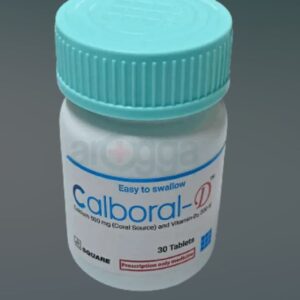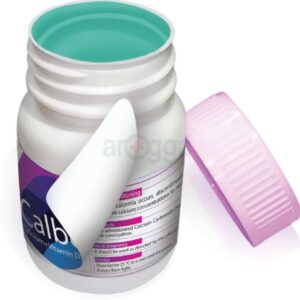Description
Introduction
Ciprocin 250 is an antibiotic, used in the treatment of bacterial infections. It is also used in treating infections of the urinary tract, nose, throat, skin and soft tissues and lungs (pneumonia). It cures the infection by stopping the further growth of the causative microorganisms. Ciprocin 250 should be used in the dose and duration as advised by your doctor. It may be taken with or without food, preferably at a fixed time. Avoid skipping any doses and finish the full course of treatment even if you feel better. Do not take a double dose to make up for a missed dose. Simply take the next dose as planned. You may experience nausea as a side effect of this medicine. This is usually temporary and resolves on its own, but please consult your doctor if it bothers you or persists for a longer duration. Diarrhea may also occur as a side effect but should stop when your course is complete. Inform your doctor if it does not stop or if you find blood in your stools. You should not take this medicine if you are allergic to any of its ingredients. Rarely, some people may have a severe allergic reaction which needs urgent medical attention. Signs of this include rash, swelling of the lips, tongue or face, shortness of breath or breathing problems. Special care should be taken in people with kidney problems while taking this medicine.
Uses of Ciprocin 250
- Bacterial infections
Side effects of Ciprocin 250
- Nausea
- Diarrhea
How to use Ciprocin 250
Take this medicine in the dose and duration as advised by your doctor. Swallow it as a whole. Do not chew, crush or break it. Ciprocin 250 may be taken with or without food, but it is better to take it at a fixed time. Avoid Ciprocin 250 with caffeine and chocolate as well as food containing caffeine and chocolate such as tea leaves, cocoa beans.
How Ciprocin 250 works
Ciprocin 250 is an antibiotic. It works by stopping the action of a bacterial enzyme called DNA-gyrase. This prevents the bacterial cells from dividing and repairing, thereby killing them.
What if you forget to take Ciprocin 250?
If you miss a dose of Ciprocin 250, take it as soon as possible. However, if it is almost time for your next dose, skip the missed dose and go back to your regular schedule. Do not double the dose.
 Quick Tips
Quick Tips- Your doctor has prescribed Ciprocin 250 to cure your infection and improve symptoms.
- Do not skip any doses and finish the full course of treatment even if you feel better.
- Discontinue Ciprocin 250 and inform your doctor immediately if you get a rash, itchy skin, swelling of face and mouth, or have difficulty in breathing.
- Diarrhea may occur as a side effect but should stop when your course is complete. Inform your doctor if it doesn’t stop or if you find blood in your stools.
- Notify your doctor if you feel pain in your tendons, numbness, or tingling sensations.
- Inform your doctor if you are pregnant or planning to conceive or breastfeeding.
 Brief Description
Brief DescriptionIndication
Cystic fibrosis, Intra-abdominal infections, Meningitis, Peritonitis, Endocarditis, Anthrax, Otitis media, Septicaemia, Lower Respiratory Tract Infections, Cystitis, Gonorrhoea, Skin and skin structure infections, Nosocomial pneumonia, Urinary tract infections, Enteric fever, Bone and Joint Infections, Biliary tract infections, Surgical Prophylaxis, Gastroenteritis, Q fever, Acute Sinusitis, Cat scratch disease, Spotted fever, Typhus, Chanroid, Brucellosis, Typhoid and paratyphoid fever, Superficial ophthalmic infections, Otitis externa
Administration
May be taken with or without food. May be taken w/ meals to minimise GI discomfort. Do not take w/ antacids, Fe or dairy products. IV Administration Infuse 1-2 mg/mL (diluted in D5W or NS) into large vein over 60 minutes
Adult Dose
Oral Adult Dose: For oral dosage & suspension: Urinary Tract infection: Acute uncomplicated: 250 mg twice daily for 3 days; Mild/Moderate: 250 mg twice daily for 7 to 14 days; Severe/Complicated: 500 mg twice daily for 7 to 14 days; Chronic Bacterial Prostitis : 500 mg twice daily for 28 days; Lower Respiratory Tract infection: Mild/Moderate: 500 mg twice daily for 7 to 14 days, Severe/Complicated : 750 mg twice daily for 7 to 14 days; Acute Sinusitis : 500 mg twice daily for 10 days; Skin and Skin Structure infection: Mild/Moderate : 500 mg twice daily for 7 to 14 days, Severe/Complicated : 750 mg twice daily for 7 to 14 days, Bone and joint infection: Mild/Moderate 500 mg twice daily for 4 to 6 weeks, Severe/Complicated : 750 mg twice daily for 4 to 6 weeks, Intra Abdominal Infection: 500 mg twice daily for 7 to 14 days, Infectious Diarrhea: Mild/Moderate/Severe: 500 mg twice daily for 5 to 7 days, Typhoid Fever : 500 mg twice daily for 10 days, Urethral & Cervical Gonococcal Infections: Uncomplicated: 250 mg Single dose. Ciprofloxacin extended release: PO Adults 500–1,000 mg q24h. For IV infusion : Urinary Tract Infection: Mild to Moderate: 200 mg 12 hourly for 7-14 days;Severe or Complicated: 400 mg 12 hourly for 7-14 days; Lower Respiratory Tract infection: Mild to Moderate: 400 mg 12 hourly for 7-14 days; Severe or Complicated: 400 mg 8 hourly for 7-14 days; Nosocomial Pneumonia: Mild/Moderate/Severe: 400 mg 8 hourly for 10-14 days; Skin and Skin Structure: Mild to Moderate: 400 mg 12 hourly for 7-14 days; Severe or Complicated: 400 mg 8 hourly for 7-14 days; Bone and Joint Infection: Mild to Moderate: 400 mg 12 hourly for more than 4-6 weeks; Severe/Comlicated: 400 mg 8 hourly for more than 4-6weeks; Intra abdominal (Acute abdomen): Complicated: 400 mg 12 hourly for 7-14 days; Acute Sinusitis: Mild/Moderate: 400 mg 12 hourly for10 days: Chronic Bacterial Prostatitis: Mild/Moderate: 400 mg 12 hourly for 28 Days.
Child Dose
Child Dose: PO 20–40 mg/kg/day, max 1.5 g/day q12h. IV 20–30 mg/kg/day, max 1.2 g/day q12h. Children and adolescents: RTI & GI infections: Neonate-15mg/kg twice daily, Child (1 month -18 years)-20mg/kg (max 750 mg) twice daily; UTI: Neonate-10 mg/kg twice daily, Child (1 month -18 years)-10mg/kg (max 750 mg) twice daily; Pseudomonal lower respiratory tract infection in cystic fibrosis: Child (1 month -18 years) – 20mg/kg (max 750 mg) twice daily; Anthrax (treatment & post exposure prophylaxis): Child (1 month -18 years) – 20mg/kg (max 750 mg) twice daily.
Renal Dose
Renal impairment CrCl >50 mL/min: Dose adjustment not necessary CrCl 30-50 mL/min: 250-500 mg PO q12hr CrCl <30 mL/min: Extended-release, 500 mg PO q24hr CrCl 5-29 mL/min: 250-500 mg PO q18hr or 200-400 mg IV q18-24hr Some clinicians suggest decreasing dose but not frequency of administration Hemodialysis: 0.25-0.5 g PO q12hr or 0.2-0.4 g IV q24hr Peritoneal dialysis: 0.25-0.5 g PO q8hr or 0.2-0.4 g IV q24hr
Contraindication
Hypersensitivity. Not to be used concurrently with tizanidine. Avoid exposure to strong sunlight or sun lamps during treatment.
Mode of Action
Ciprofloxacin promotes breakage of double-stranded DNA in susceptible organisms and inhibits DNA gyrase, which is essential in reproduction of bacterial DNA.
Precaution
Epilepsy, history of CNS disorders; severe renal or hepatic dysfunction; G6PD deficiency; maintain adequate hydration; myasthaenia gravis. Caution when used in patients with QT prolongation or risk factors e.g. bradycardia, pre-existing cardiac disease or uncorrected electrolyte disturbances. Discontinue treatment if patients experience tendon pain, inflammation or rupture. Avoid usage in methicillin-resistant staphylococcus aureus (MRSA) infections due to high level of resistance. May impair ability to drive or operate machinery. Safety and efficacy have not been established in pregnant and lactating women. Not to be used in children <18 yr; except where benefit clearly exceeds risk. Lactation: Drug enters breast milk; use not recommended (American Academy of Pediatrics Committee states that drug is compatible with nursing)
Side Effect
1-10% Nausea (3%),Abdominal pain (2%),Diarrhea (2% adults; 5% children),Increased aminotransferase levels (2%),Vomiting (1% adults; 5% children),Headache (1%),Increased serum creatinine (1%),Rash (2%),Restlessness (1%) <1% Acidosis,Allergic reaction,Angina pectoris,Anorexia,Arthralgia,Ataxia,Back pain,Bad taste,Blurred vision,Breast pain,Bronchospasm,Diplopia,Dizziness,Drowsiness,Dysphagia,Dyspnea,Flushing,Foot pain,Hallucinations,Hiccups,Hypertension,Hypotension,Insomnia,Irritability,Joint stiffness,Lethargy,Migraine,Nephritis,Nightmares,Oral candidiasis,Palpitation,Photosensitivity,Polyuria,Syncope,Tachycardia,Tinnitus,Tremor,Urinary retention,Vaginitis Potentially Fatal: Anaphylactoid reaction; cardiopulmonary arrest.
Pregnancy Category Note
Pregnancy category: C Lactation: Drug enters breast milk; use not recommended (American Academy of Pediatrics Committee states that drug is compatible with nursing)
Interaction
May increase plasma concentrations of CYP1A2 substrates (e.g. clozapine, ropinirole, theophylline). Enhances effect of oral anticoagulants (e.g. warfarin) and glibenclamide. Increased toxicity of methotrexate. Plasma concentrations may be increased by probenecid. Reduced absorption w/ oral multivitamins and mineral supplements containing divalent or trivalent cations (e.g. Fe, Zn, Ca) and antacids containing Al, Ca or Mg. Concomitant use w/ class IA antiarrhythmics (e.g. quinidine, procainamide), class III antiarrhythmics (e.g. amiodarone, sotalol), TCAs, macrolides and antipsychotics may result in additive effects on QT interval prolongation. Concurrent use w/ corticosteroids may increase risk of severe tendon disorders. Increased risk of CNS stimulation w/ NSAIDs. Altered serum concentrations of phenytoin. Potentially Fatal: Marked elevation in serum levels of tizanidine which is associated w/ potentiated hypotensive and sedative effect.









There are no reviews yet.